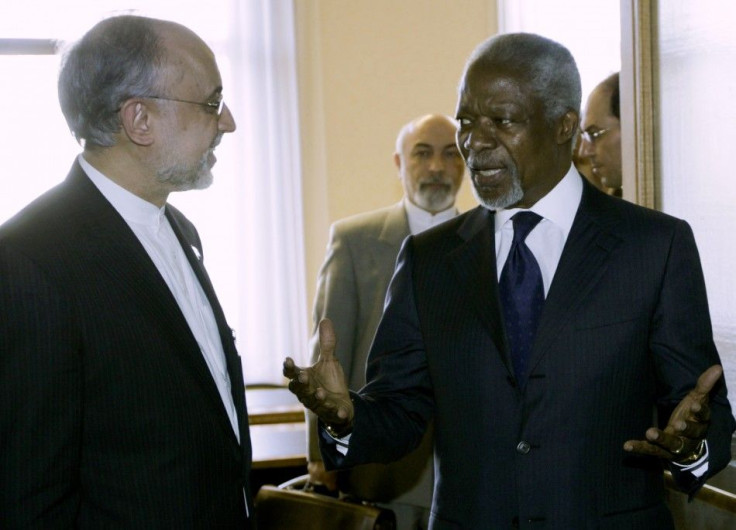Syria: With Annan's Ceasefire Plan On The Brink Of Failure, What Next?

On his visit to Tehran on Wednesday, the U.N. and Arab League envoy on Syria, Kofi Annan, expressed renewed hope that Syria may still meet the ceasefire deadline set for Thursday, despite renewed fighting and rising concerns that the ceasefire plan has failed.
Annan insisted that if the Damascus government respects the agreed-upon conditions for peace and remains committed to the plan, we could still see a ceasefire by the Thursday deadline.
In a final effort to salvage the plan, Annan went to Iran, one of Syria's closest allies, to seek support. Iran, given its special relations with Syria, can be part of the solution, Annan said during a news conference with Iran's Foreign Minister Ali Akbar Salehi.
So far, Iran has openly opposed any foreign intervention in Syria.
Annan told reporters in Tehran, We've been in touch with them (Syrian rebels) and have had positive answers from them. .. I have received government assurances they will respect the ceasefire. If everyone respects it, I think by six in the morning on Thursday we shall see improved conditions on the ground.
But time is ticking, and with renewed violence and shelling as the deadline looms, few share Annan's optimism.
Although Damascus had agreed to begin pulling out government troops by Tuesday, shelling has continued into Wednesday. According to US Secretary of State Hillary Clinton, In fact, the violence has only got worse over this last week, in spite of Annan's six-point ceasefire plan.
U.S. ambassador to the United Nations Susan Rice was not surprised. She said it was outrageous but by no means unexpected or surprising that the government (of Syria) has yet again made commitments and broken them.
And to those who claim the plan has already failed, Annan replied, If you want to take it off the table, what would you replace it with?
Experts on Syria told CNN that admitting the failure of the Annan plan would force governments to begin considering tough questions about what to do next.
Ar source close to the Obama administration's deliberations on Syria told CNN that with the failure of this plan, the U.S. will now face even more difficult decisions.
The harder choices are: Do we get involved or not, and under what circumstances? the source said. I don't think that's immediately on the horizon.
But according to Jon B. Alterman, director of the Middle East Program at the Center for Strategic and International Studies, it is time to discuss alternative long-term plans for Syria, as the situation will likely get worse. The focus should shift from Thursday to a more permanent solution.
There are an awful lot of ways that Syria could turn really, really horrible, he told CNN. If the goal is not to just make something better this week in Syria, the goal is how, when you come out of this period, do you try to lay the groundwork for Syria to be a better place in three years than it is now?
© Copyright IBTimes 2025. All rights reserved.





















